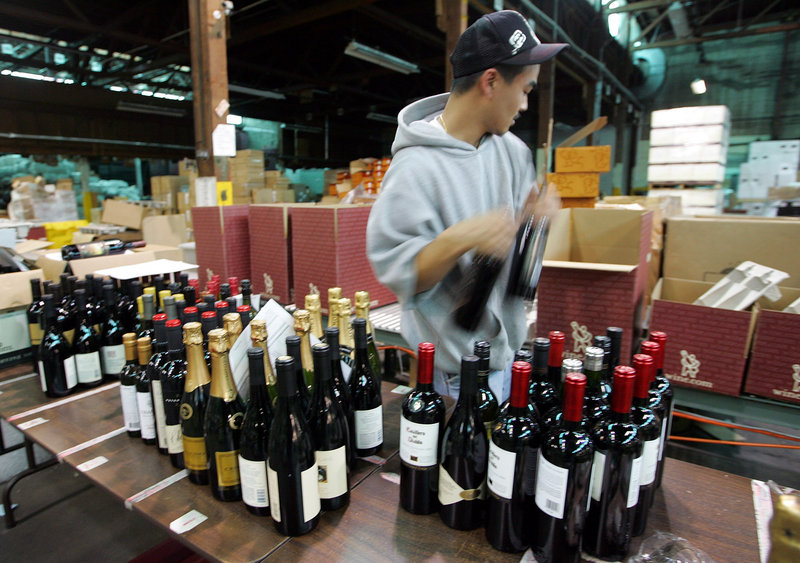WASHINGTON — With little public notice, distributors of alcoholic beverages are pressing for a federal law that would allow states to block interstate sales of wine and beer to their residents — a result that could limit consumer choices, raise prices and hurt hundreds of small vintners and microbrewers.
A bill pending in the House would put the authority to regulate alcohol more squarely in the hands of the states and would require those challenging the regulations to prove the rules violate federal law or the Constitution.
And it would supersede a number of recent court rulings that have struck down limits on interstate sales of alcoholic beverages.
“It’s the cumulative effect of all these lawsuits, and the confusion,” said Paul Pisano, a vice president at the National Beer Wholesalers Association, which proposed the legislation in the spring and backs a lobbying campaign. “We’re asking to make sure that states aren’t having their hands tied when they’re trying to defend their alcohol laws.”
Critics countered that the distributors’ real motive is to restrict competition.
Internet and direct-mail sales have become essential to the growth of smaller winemakers and microbrewers in the last decade.
South Coast Winery in Temecula, Calif., for instance, sells almost 30 percent of its wine through a 10,000-member wine club and ships to customers in about 20 states, owner Jim Carter said.
“It’s very important for small wineries, especially, to be able to have these wine clubs because it’s our best vehicle for dealing direct with the public,” Carter said. “We sell more wine through our wine club than we sell in the wholesale market.”
Through consolidation in recent years, many markets are controlled by only a handful of high-volume distributors, and they have little incentive, critics contend, to carry wines and beers that are available only in small quantities.
As they grew through mergers and acquisitions, wholesalers and distributors lobbied states for laws that would in effect block interstate sales. But federal courts have struck down some of those laws, prompting the companies to turn to Congress.
They argue that direct sales pose a threat to public health and enable minors to buy alcohol illegally. But critics scoff at such claims, saying, for instance, that few minors seeking alcohol are likely to order more expensive craft beers and wines from faraway states.
So far, in 37 states, including Maine, and the District of Columbia, lovers of either wine or beer or both enjoy some form of direct-to-consumer shipping. Should those states be allowed to restrict such sales, residents could see their choices narrowed — and prices raised.
Jerry Ellig, a research fellow at the Mercatus Center at George Mason University, studied wine prices in the years before and after Virginia enacted a law in 2003 to allow direct shipping to residents. The study, published in 2007, found that the law had prodded retail stores to become more competitive with online sellers.
Liquor makers also have weighed in, arguing that the bill could go beyond direct shipping by allowing states to enact laws relating to taxes, advertising and labeling.
Bourbon makers fear that states would allow local distillers to brand their products as bourbon by overriding federal law that states a whiskey can be labeled as bourbon only if it is made from at least 51 percent corn and aged in new charred-oak barrels.
Vintners, brewers and the Distilled Spirits Council of the United States have lobbied many of the bill’s 136 co-sponsors and organized the mailing of thousands of consumer letters in opposition.
“I can’t remember a time that we’ve ever really held hands and worked this closely before,” said Mark Gorman, the council’s senior vice president for government relations.
With an annual lobbying budget of more than $4 million, the council is a powerful ally for small wine and beer producers. Lobbyists for beer giants Anheuser-Busch Cos. and MillerCoors also have mobilized against the bill.
Yet when it comes to campaign contributions in the current election cycle, wholesalers and distributors outmatch the coalition of producers. They have donated more than $2.2 million to House members, including $922,000 to lawmakers who signed on to the bill as sponsors, according to the Center for Responsive Politics.
The National Beer Wholesalers Association made contributions to at least 53 of the bill’s co-sponsors within one day to 30 days of the lawmakers’ signing on.
“I don’t think there’s an industry around that’s got the time and the money that these guys have,” said Rep. Mike Thompson, D-Calif., whose district includes the wine regions of Napa, Sonoma and Mendocino counties.Maine law allows residents to order wine from vineyards that have licenses to do business with Maine residents.
Wine cannot be delivered without a valid photo ID that proves that the consumer is over 21.
The state also allows Maine wineries to ship to out-of-state consumers.
Copy the Story LinkSend questions/comments to the editors.



Success. Please wait for the page to reload. If the page does not reload within 5 seconds, please refresh the page.
Enter your email and password to access comments.
Hi, to comment on stories you must . This profile is in addition to your subscription and website login.
Already have a commenting profile? .
Invalid username/password.
Please check your email to confirm and complete your registration.
Only subscribers are eligible to post comments. Please subscribe or login first for digital access. Here’s why.
Use the form below to reset your password. When you've submitted your account email, we will send an email with a reset code.